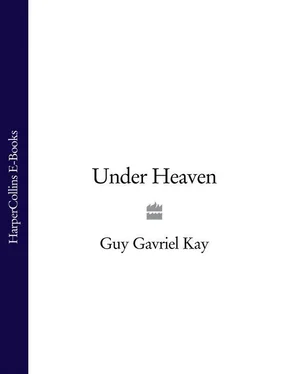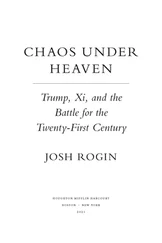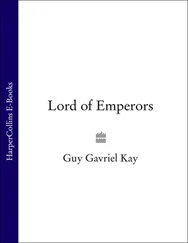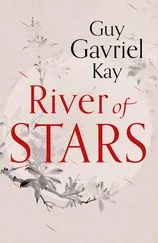He remembered the silk of her voice, the devastating sweetness with which she could say such things. He had kissed the palm held against his mouth, then said, softly, as she moved it a little away, “You must do what seems best to you, for your life. I do not want you to be one of those women waiting at a window above jade stairs in the night. Let someone else live those poems. My intention is to go back to my family’s estate, observe the rites for my father, then return. I can tell you that.”
He had not lied. It had been his intention.
Things had fallen out otherwise. What man would dare believe that all he planned might come to pass? Not even the emperor, with the mandate of heaven, could make that so.
He had no idea what had happened to her, if someone had indeed taken her from the courtesans’ quarter, claimed her for his own behind the stone walls of an aristocrat’s city mansion in what was almost certainly a better life. No letters came west of Iron Gate Pass, because he had not written any.
It didn’t have to be a case of one extreme or the other, he finally thought: not Xinan set against this beyond-all-borders solitude. The Path’s long tale of wisdom taught balancing, did it not? The two halves of a man’s soul, of his inward life. You balanced couplets in a formal verse, elements in a painting—river, cliff, heron, fishing boat—thick and thin brush strokes in calligraphy, stones and trees and water in a garden, shifting patterns in your own days.
He could go back home to their stream, for example, instead of to the capital, when he left here. Could live there and write, marry someone his mother and Second Mother chose for him, cultivate their garden, the orchard—spring flowers, summer fruit—receive visitors and pay visits, grow old and white-bearded in calm but not solitude. Watch the paulownia leaves when they fell, the goldfish in the pond. Remember his father doing so. He might even, one day, be thought a sage. The idea made him smile, in moonlight.
He could travel, east down the Wai, or on the Great River itself through the gorges to the sea and then back: the boatmen poling against the current, or towing the boats west with thick ropes along slippery paths cut into the cliffs when they came to the wild gorges again.
He might go even farther south, where the empire became different and strange: lands where rice was grown in water and there were elephants and gibbons, mandrills, rosewood forests, camphor trees, pearls in the sea for those who could dive for them, and where tigers with yellow eyes killed men in the jungles of the dark.
He had an honoured lineage. His father’s name offered a doorway through which Tai could walk and find a welcome among prefects and taxation officers and even military governors throughout Kitai. In truth, First Brother’s name might be even more useful by now, though that had its own complexities.
But all of this was possible. He could travel and think, visit temples and pavilions, pagodas in misty hills, mountain shrines, write as he travelled. He could do it just as the master poet whose lines he had awakened with had done, was probably still doing somewhere. Though honesty (and irony) compelled the additional thought that Sima Zian seemed to have done as much drinking as anything else through his years on the boats and roads, in the mountains and temples and bamboo groves.
There was that, too, wasn’t there? Good wine, late-night fellowship. Music. Not to be dismissed or despised.
Tai fell asleep on that thought, and with the sudden, fervent hope that the Tagurans had remembered to bring wine. He had almost finished what his own people had delivered two weeks ago. The long summer twilight gave a man more time to drink before going to bed with the sun.
He slept, and dreamed of the woman with her hand on his heart that last night, then over his mouth, her shaped and painted moth-eyebrows, green eyes, red mouth, candlelight, jade pins pulled slowly one by one from golden hair, and the scent she wore.
THE BIRDS WOKE HIM from the far end of the lake.
He had attempted a formal six-line poem several nights ago, their strident morning noise compared to opening hour at the two markets in Xinan, but hadn’t been able to make the parallel construction hold in the final couplet. His technical skills as a poet were probably above average, good enough for the verse component of the examinations, but not likely, in his own judgment, to produce something enduring.
One of the results of two years alone had been his coming to think this, most of the time.
He dressed and built a fire, washed himself and tied back his hair while boiling water for tea. He glanced in the bronze mirror he’d been given and thought about taking a blade to his cheeks and chin, but decided against such self-abuse this morning. The Tagurans could deal with him unshaven. There was no real reason to even tie his hair but he felt like a steppes barbarian when he left it on his shoulders. He had memories of that, of them.
Before drinking or eating, while the tea leaves were steeping, he stood at the eastern window and spoke the prayer to his father’s spirit in the direction of sunrise.
Whenever he did this, he summoned and held a memory of Shen Gao feeding bread to the wild ducks in their stream. He didn’t know why that was his remembrance-image, but it was. Perhaps the tranquility of it, in a life that had not been tranquil.
He prepared and drank his tea, ate some salt-dried meat and milled grain in hot water sweetened with clover honey, then he claimed his peasant-farmer straw hat from a nail by the door and pulled on his boots. The summer boots were almost new, a gift from Iron Gate, replacing the worn-out pair he’d had.
They had noticed that. They observed him closely whenever they came, Tai had come to understand. He had also realized, during the first hard winter, that he’d almost certainly have died here without the help of the two forts. You could live entirely alone in some mountains in some seasons—it was a legend-dream of the hermit-poet—but not at Kuala Nor in winter, not this high up and remote when the snows come and the north wind blew.
The supplies, at new and full moon without fail, had kept him alive—and had arrived only through extreme effort several times, when wild storms had bowled down to blast the frozen meadow and lake.
He milked the two goats, took the pail inside and covered it for later. He claimed his two swords and went back out and did his Kanlin routines.
He put the swords away and then, outside again, stood a moment in almost-summer sunshine listening to the shrieking racket of birds, watching them wheel and cry above the lake, which was blue and beautiful in morning light and gave no least hint at all of winter ice, or of how many dead men were here around its shores.
Until you looked away from birds and water to the tall grass of the meadow, and then you saw the bones in the clear light, everywhere. Tai could see his mounds, where he was burying them, west of the cabin, north against the pines. Three long rows of deep graves now.
He turned to claim his shovel and go to work. It was why he was here.
His eye was caught by a glint to the south: sunlight catching armour halfway along the last turning of the last slope down. Looking more narrowly he saw that the Tagurans were early today, or—he checked the sun again—that he was moving slowly himself, after a moon-white, waking night.
He watched them descend with the bullock and the heavywheeled cart. He wondered if Bytsan was leading the supply party himself this morning. He found himself hoping so.
Was it wrong to anticipate the arrival of a man whose soldiers would rape his sister and both mothers and joyfully sack and burn the family compound during any incursion into Kitai?
Читать дальше












